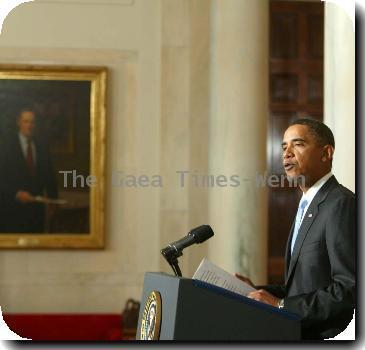Democratic-controlled Senate approves $1.9T increase in federal borrowing limit
By Andrew Taylor, APThursday, January 28, 2010
Senate permits gov’t to borrow an additional $1.9T
WASHINGTON — The Senate voted Thursday to allow the government to go a whopping $1.9 trillion deeper in debt, offering a vivid election-year reminder that the government has to borrow 40 cents of every dollar it spends.
The measure would put the government on track for a national debt of $14.3 trillion — more than $45,000 for every man, woman and child in the United States. And the debt is increasingly held by foreign nations such as China.
The budget for the current year is about $3.5 trillion and the deficit will probably match last year’s $1.4 trillion. The government would have to borrow to cover that $1.4 trillion.
The measure passed 60-39 under ground rules insisted upon by Republicans that required 60 votes to pass it. Democrats and allied independents control 60 seats — for now — and were only able to win the vote because Republican Sen.-elect Scott Brown of Massachusetts has yet to be seated.
While Thursday’s vote went smoothly, it came after weeks of difficult negotiations between the White House and both House and Senate Democrats.
Moderate House “Blue Dog” Democrats came away with a tough new “pay-as-you-go” budget law to make it harder to run up the deficit with new tax cuts or federal benefit programs. Senate Democrats won a promise from President Barack Obama to name a bipartisan task force to come up with a plan for dealing with the spiraling debt — but one whose recommendations are unlikely to ever see an up-or-down vote.
Meanwhile, Obama won symbolic support for his proposal for a partial domestic spending freeze.
A 56-strong majority of senators supported a plan, by Sens. Jeff Sessions, R-Ala., and Claire McCaskill, D-Mo., that was strikingly similar to Obama’s freeze on domestic programs annually funded by Congress. It failed because 60 votes were required, but the tally serves as a positive sign that even though there’s significant opposition from Democratic liberals, Obama’s domestic freeze is likely to be adopted when Congress debates its budget.
The debt limit increase comes as a relief to Democrats worried about having to cast multiple, bite-sized increases in the debt in the run-up to the critical midterm elections this fall. Instead, the new limit would allow majority Democrats to avoid another vote until after the midterm elections this fall.
The House is slated to vote on the debt legislation next week to send it to Obama to be signed into law. The new pay-as-you-go rules, approved by the Thursday on a 60-40 vote, should help House leaders round up the votes, despite the political anxiety caused by Brown’s stunning win in heavily-Democratic Massachusetts last week.
The new budget rules are designed to curb the spiraling deficit by requiring spending increases or tax cuts to be “paid for” with cuts to other programs or tax increases. If the rules are broken, the White House budget office would force automatic cuts to programs like Medicare, farm subsidies and veterans’ pensions.
The idea is that the threat of cuts to such popular programs would be enough to block Congress’ free-spending ways, but skeptics say lawmakers can find ways around them fairly easily. Weaker pay-as-you-go rules are in place already, but have been routinely waived.
The new rules would have the force of law and would make it harder to extend permanently some tax cuts — especially on large estates and middle-class tax filers threatened by the alternative minimum tax — that expire at the end of this year.
Lawmakers would be able to extend President Bush’s middle-class tax cuts past their expiration a year from now even though they would add another $1.4 trillion to the debt over the next decade. But the top rate for individuals making more than $200,000 and couples earning over $250,000 would rise from 35 percent to 39.6 percent.
Extended unemployment benefits for the long-term jobless coming to a vote next month may also be exempt at a cost of tens of billions dollars more.
Republicans generally opposed the rules as a recipe for tax increases. There had been a few GOP supporters in the past, but Republicans who had voted for the rules in earlier years switched their positions and opposed them.
They included John McCain of Arizona, facing a primary battle with former Rep. J.D. Hayworth, who’s winning support from conservative anti-tax “tea party” activists.
Obama’s promise to name a bipartisan deficit task force promises to have less of an impact.
Unlike a proposal rejected this week that would legally bind Congress to vote on a commission’s plans, there’s no way to force the Senate to take a vote on the panel’s recommendations. Those would likely blend tax increases with painful spending curbs to programs like Medicare, Medicaid and Social Security — which would probably die as a result of a filibuster.
Tags: Barack Obama, Events, General Elections, Government Programs, Government-funded Health Insurance, North America, Political Organizations, Political Parties, Union, United States, Washington








